Arts & Entertainment
Mark of the ‘Beast’
Novelist Louis Bayard explores Brazil circa 1914 in new adventure
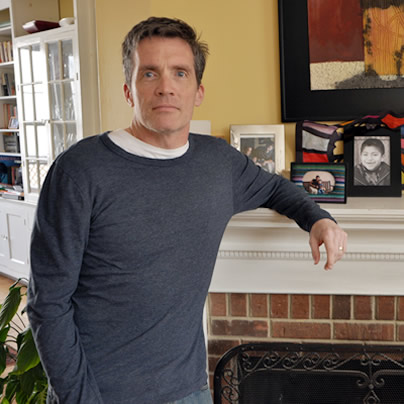
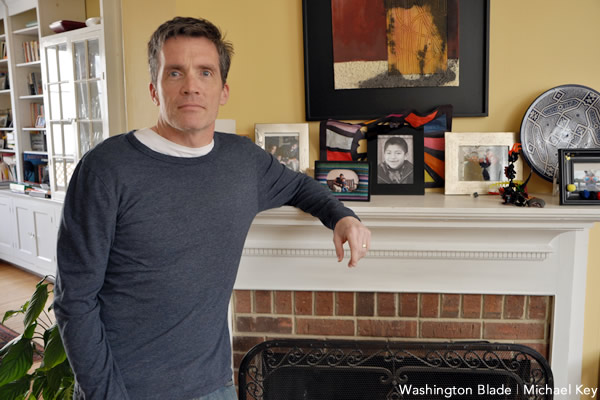
In Louis Bayard’s new novel, Col. Theodore Roosevelt and his son, Kermit, are kidnapped by a mysterious Amazonian tribe in Brazil circa 1914 and must find and kill a ravenous beast to survive. (Washington Blade photo by Michael Key)
‘Roosevelt’s Beast’
By Louis Bayard
Henry Holt and Company
Available March 18
320 pages
Hardcover
$27
Appearances:
Politics & Prose
5015 Connecticut Ave., N.W.
March 23
5 p.m.
One More Page Books
2200 N. Westmoreland St. No. 101
Arlington, VA
March 27
7 p.m.
Listen for Bayard on the “Diane Rehm Show” (WAMU 88.5)
On March 24 at 11 a.m.
Details at louisbayard.com
Washington novelist Louis Bayard, whose new work “Roosevelt’s Beast” will be released Tuesday, spent a whirlwind hour with the Blade two weeks ago touching on everything from how he got started and how his career developed to what he tells young writers in his classes at George Washington University and how he wrestled the “Beast” that is his latest novel.
Bayard, 50, and his partner of 26 years, Don Montuori, are married and have two sons, ages 13 and 11. They live in Capitol Hill. Bayard, born in Albuquerque but raised mostly in Springfield, Va., moved to Washington in 1988, worked on the Hill and later did PR for various environmental groups through the ‘90s. His first novel, the gay-themed “Fool’s Errand,” was published by gay press Alyson Books in 1999. “Roosevelt’s Beast” is his sixth book. He’s not sure how many books he’s sold total, but upon consulting with his publisher, estimates the number to be about 100,000.
His comments have been slightly edited for length.
WASHINGTON BLADE: You went to Princeton and Joyce Carol Oates is quoted on the back of your new book. Did you take her creative writing course?
LOUIS BAYARD: Yes. She was also my adviser.
BLADE: What did you learn from her?
BAYARD: She was a very exacting reader, so it forced me to think about every word I write and I really do sweat every word. You do sometimes start to think over the course of a book, “Does this really matter,” but I revise and review and I think it’s because I had that kind of very hard eye that sniffs out deceit and flabbiness and all the stuff that can go wrong in prose. I don’t recall any specific lesson. I just recall how nice it was to feel understood by somebody of her caliber.
BLADE: Was it a big leap from Alyson to HarperCollins, which published your third book “Mr. Timothy”? How did that play out?
BAYARD: Alyson was one of the few places that would take an un-agented manuscript. The first book was gay-themed and they were a gay publisher so I just thought, “Why not take it straight to them?” It was a good fit for what I was doing. … But then when I had an idea for this book about Tiny Tim (2003’s “Mr. Timothy”), I thought, “I don’t just want this to be plunked on the gay shelf at Borders.” There was that sense of being ghettoized by virtue of being with a gay press. You go on that one shelf in the back of the store. I wanted this out in the front, so I found an agent, finally, after several tries, and he pitched it to the big houses and one of them bit.
BLADE: Would you call that your big break?
BAYARD: I guess you’d call it a break. It seemed like a break at the time. It was a break toward the mainstream, I guess, but I never felt like I’ve left the gay sensibility entirely behind.
BLADE: Do you enjoy teaching?
BAYARD: I do. I wish it paid a little more honestly. I’m there as an adjunct where you’re paid some ridiculous pittance for a lot of work, but I have other income sources. I just teach one fiction writing class.
BLADE: What do you tell your students?
BAYARD: To me, every student is a little different and they all bring something a little different so I just try to create a space where they can experiment and find their own voices. … It’s a workshop, so I’m basically like Socrates there in the midst, throwing out questions and making them think about things.
BLADE: About how many would you say have been good enough to get published?
BAYARD: Of the three years I’ve been doing it, I would say, maybe there were about that many who had the potential to do it. It would really be about desire. Actually the best writer I know of, and I can’t even remember her name offhand, but she was exceptional but actually was the least interested in pursuing it. I kept saying, “You really need to try this,” but she kept saying, “Well, I’m going to Europe” and she had all these plans. She just didn’t seem excited about it. That’s where perseverance pays off as much as anything.
BLADE: You went from gay contemporary fiction into several novels of historical fiction. How did that creative decision come about?
BAYARD: I thought it was an accident when I had this idea to see what became of Tiny Tim, but it achieved a certain amount of success so they kind of wanted me to keep doing that and I’ve come to believe it was a fortuitous accident because it really is the genre that’s most suited to me. I kind of fought it for a while, but now I’ve accepted that I stumbled into the right place.
BLADE: Does writing fiction about people who really lived, like Theodore Roosevelt in your new book, make it seem more real? What is the appeal?
BAYARD: I think there’s both a promise and a challenge that comes with that. People will recognize then name … and perhaps be intrigued as a result, but the challenge is that then you have to make this very well-known character come alive in your own way. It has to be convincing and plausible. You kind of have to work with people’s expectations but also make it a character that lives on the page.
BLADE: Do you have history geeks call you out on minutiae?
BAYARD: Oh yes.
BLADE: What do you say?
BAYARD: Sorry! Old ladies will e-mail me and say something like, “But there were no poinsettias in English drawing rooms in 1842” or “mockingbirds hadn’t migrated as far north as the Hudson Valley by 1830,” and you just go, “Sorry — that’s why I’m a novelist. I get to make things up or change things around if they don’t work.” I try to be as historically accurate as possible, but I think the story’s more important than the history.
BLADE: Is the line between contemporary literature and popular fiction sometimes arbitrary? Where do you feel your books fall on the continuum?
BAYARD: I think of them as sort of a hybrid between literary and genre. I have genre elements, like a mystery or thriller plot, but — what can I say without sounding self regarding? — I do take care with the language and use literary devices. I’m fine with people who just consider them entertainments. I don’t think of them as literature with a capitol L, but I do write to entertain. That’s my first aim. I want it to be a good book, but want you to feel good about yourself the next morning.
BLADE: What’s the gulf like between the two worlds? In music, for instance, there seems to be a pretty sizable gulf between classical and pop.
BAYARD: I think the gulf is narrowing because we’re seeing people like Michael Chabon and Colson Whitehead who are literary figures but who are also very deliberately writing in genre and I love the idea of breaking down that wall because I think it’s a silly distinction. I’m thinking of Richard Price who has written these great crime novels set in New York like “Clockers” and “Lush Life.” They’re police procedurals, they’re genre, but they’re such brilliant dissections of our society and they’re so ambitious, so beautifully crafted. The dialogue is extraordinary and I think he should be considered a literary artist.
BLADE: You wrote two gay-themed contemporary novels set in Washington. What kind of reactions did you get? Did people assume they were roman a clefs?
BAYARD: I guess there was a little bit of that assumption.
BLADE: But you had a sense that people outside of your acquaintance circle were reading and enjoying them?
BAYARD: I think so. Periodically I hear from them. “Fool’s Errand” seems to have a very small but enthusiastic cult. There may only be 12 of them but I hear from them on the order of once a year or so. They were conceived as entertainments so I didn’t expect them to be embraced as the next coming of Edmund White or something. I did worry that when I moved onto other things, that it would be seen as turning my back on gay readers and gay bookstores.
BLADE: Did anybody float that theory to you?
BAYARD: No, I probably projected it onto them. I maintain that my books since then still have a gay vibe and I’ve had gay characters in other books. Kermit Roosevelt in this new book isn’t gay, but he’s not really about heteronormative ideals. I don’t write about he-men.
BLADE: Was there a sense that you started out writing what you knew, then graduated onto tougher projects?
BAYARD: Oh, that’s interesting. “Fool’s Errand” required zero research. I just drew from my own life and my friends’ lives. “Mr. Timothy” was really the first book where I had to come up with a whole other world, but it was a challenge I wanted to embrace. There’s only so much you can squeeze out of your own life and I’m pretty quiet honestly. Not a lot of drama.
BLADE: How do you deem success for these various projects? Is there a sales threshold you like to hit?
BAYARD: To me, success is earning back the advance they give me.
BLADE: Now that you have several under your belt, do you feel freer to experiment? The book world seems like a jungle these days. Do you have any sense that if you wrote something that bombed, they would give you another shot?
BAYARD: No, I don’t think they would. This was the second of a two-book deal so after this I’m a free agent.
BLADE: So do you feel a lot of pressure?
BAYARD: The pressure is that I want to keep doing this indefinitely so I feel obliged to get a certain number of nice critical reviews and sell a certain amount. But there are plenty of mid-list writers who earn back their advances and are doing everything they need to do but are being dropped from publishing houses. It’s a little scary. The whole business is contracting. They seem to want more high concept stories — you know, werewolves and vampires and what not. Zombies. So you do sort of feel you’re dancing as fast as you can most of the time.
BLADE: Sounds nerve wracking.
BAYARD: It is, but it’s the business too, not just authors. Publishers are shit scared and nobody knows anything. Which can be freeing in a way. You think, “Well, I may not know anything, but I know as much as they do.” What’s commercial? Nobody expected “The Da Vinci Code” to become the monster hit that it became, so I don’t know. It’s a weird time.
BLADE: Where does the drive come from? Did you always want to do this?
BAYARD: Oh, I’ve known since I was 10 on some level.
BLADE: What was the appeal?
BAYARD: Well, every writer starts as a reader. I loved reading from an early age, though my kids don’t. I always have and it’s the thing I love more than anything. So you start as a reader then you realize you want to create the same effect on someone else that these writers did on you. It was really in high school that I first started finding a voice of some kind. … My first credits were in gay magazine called Genre. Are they still around?
BLADE: Well, it’s funny you should mention that. (Editor’s note:Genre and Washington Blade previously had the same owners.)
BAYARD: Eventually my first novel came out and kind of went nowhere and there were a couple years where I wasn’t writing much at all, but there was always part of me that kept coming back to this. I think the surest test of a vocation is that you keep going forward even in the face of rejection. Even if it’s not clear that anybody in the world wants to read what you write.
BLADE: How tedious is the actual process? Are there points along the way you want to rip your hair out or is there joy in the problem solving?
BAYARD: Both. It’s an unstable compound of all those things. I wish it got easier. I used to think it would, but it really doesn’t.
BLADE: What’s the most common mistake you see in your students?
BAYARD? A lot of them are very entranced with words. They’re just discovering word power so they write these amazing, gorgeous, beautiful sentences. … A young writer throws everything at you because they want to impress and stun and overwhelm but. As I get older, I’m realizing you need less and less. Oddly enough, they neglect story. It’s amazing how many of them don’t know what their story is.
BLADE: Lots of authors might have one or two good books in them, but to keep doing this over many years is quite a feat. Yet it seems you’re heading down that path. Was there a point you felt you’d turned a corner?
BAYARD: Oh, I never feel I’ve made it. Yes, there are things that might look like success, but for me, it’s a constantly moving goalpost. I used to say all I wanted was to get reviewed in the New York Times. My second book was, but then I ended up in a depressive tailspin the week after. It’s a hard thing to chase because you never feel completely successful.
BLADE: What’s next?
BAYARD: Probably a young-adult novel set in the Great Depression. That’s about all I can say. It would be another jump, but it’s the only growth sector in publishing. I’m reading a lot of young-adult stuff and I’ve been very impressed by the quality. Some of it’s really excellent.
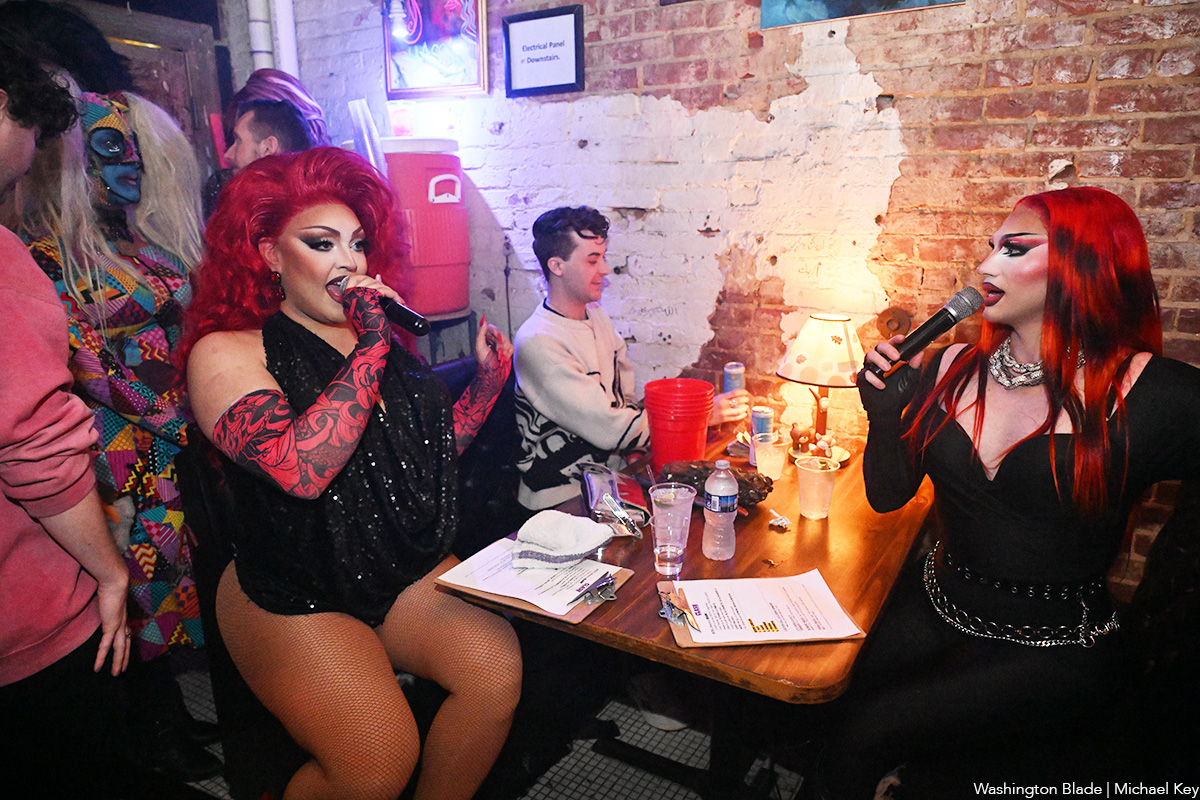
Crimsyn and Tatianna hosted the new weekly drag show Clash at Trade (1410 14th Street, N.W.) on Feb. 14, 2026. Performers included Aave, Crimsyn, Desiree Dik, and Tatianna.
(Washington Blade photos by Michael Key)
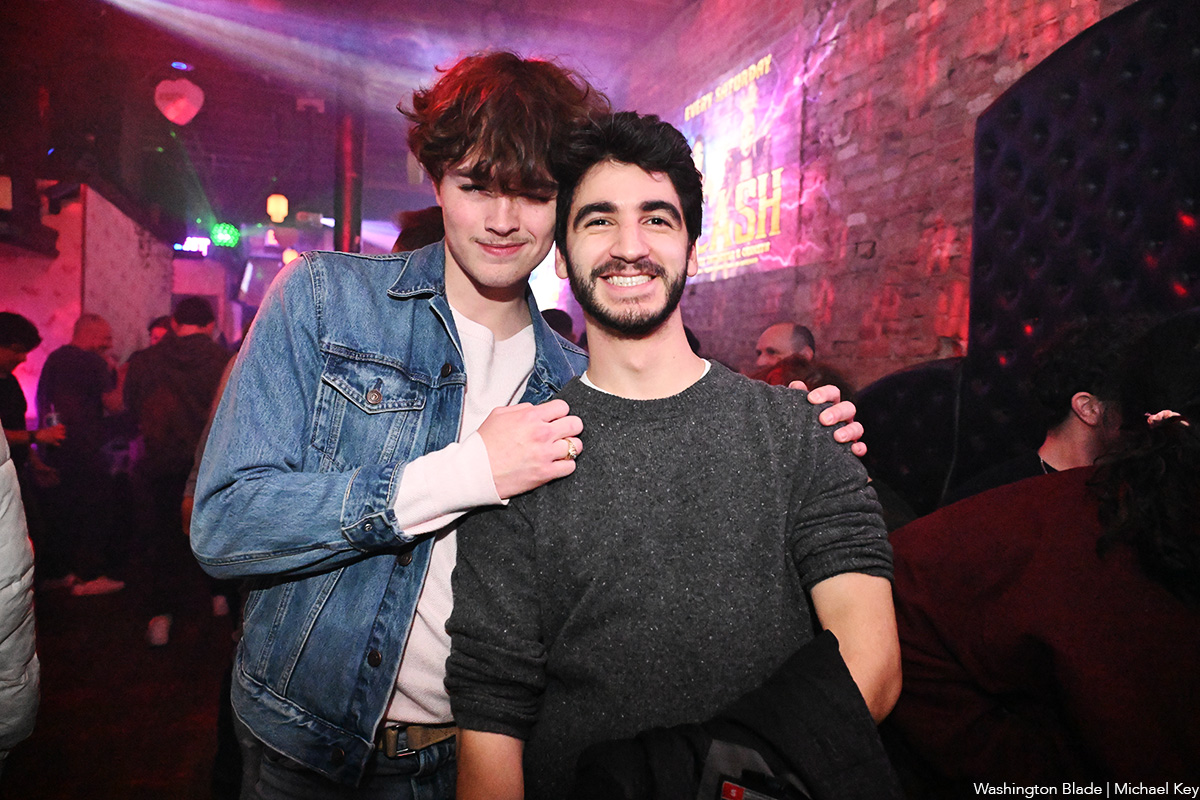
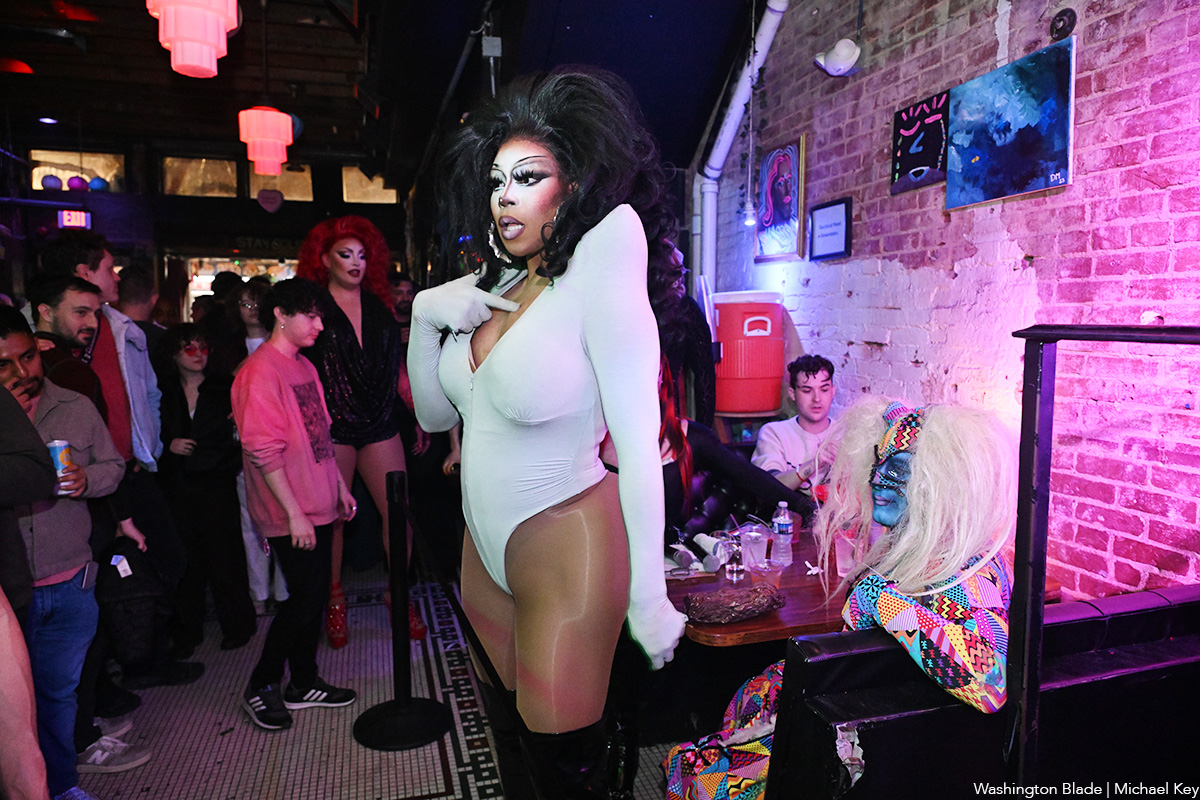
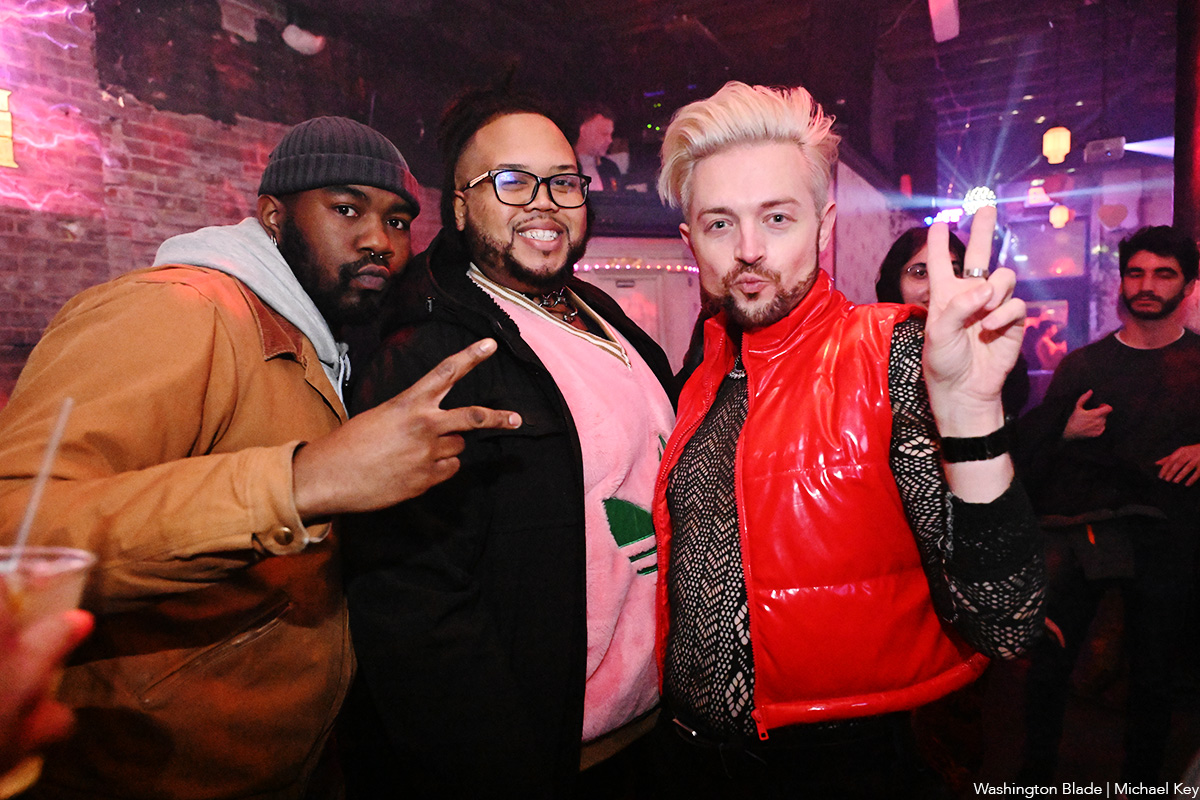
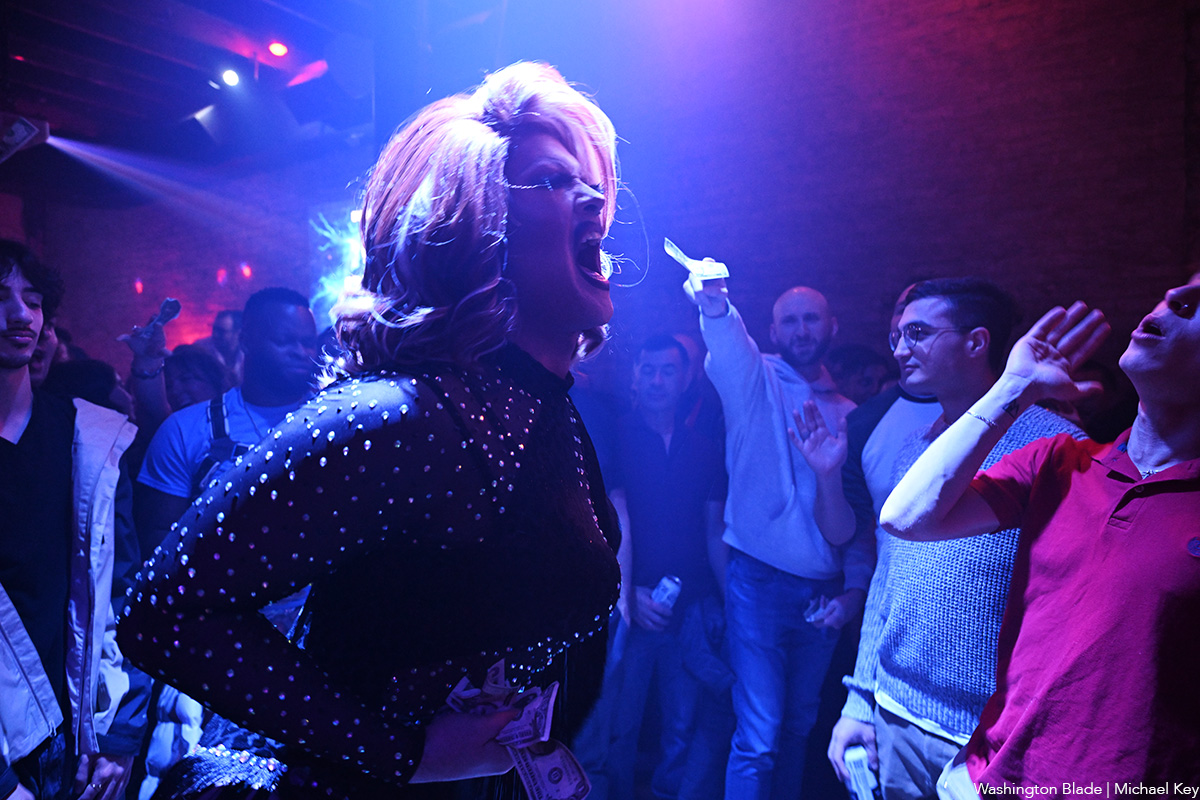
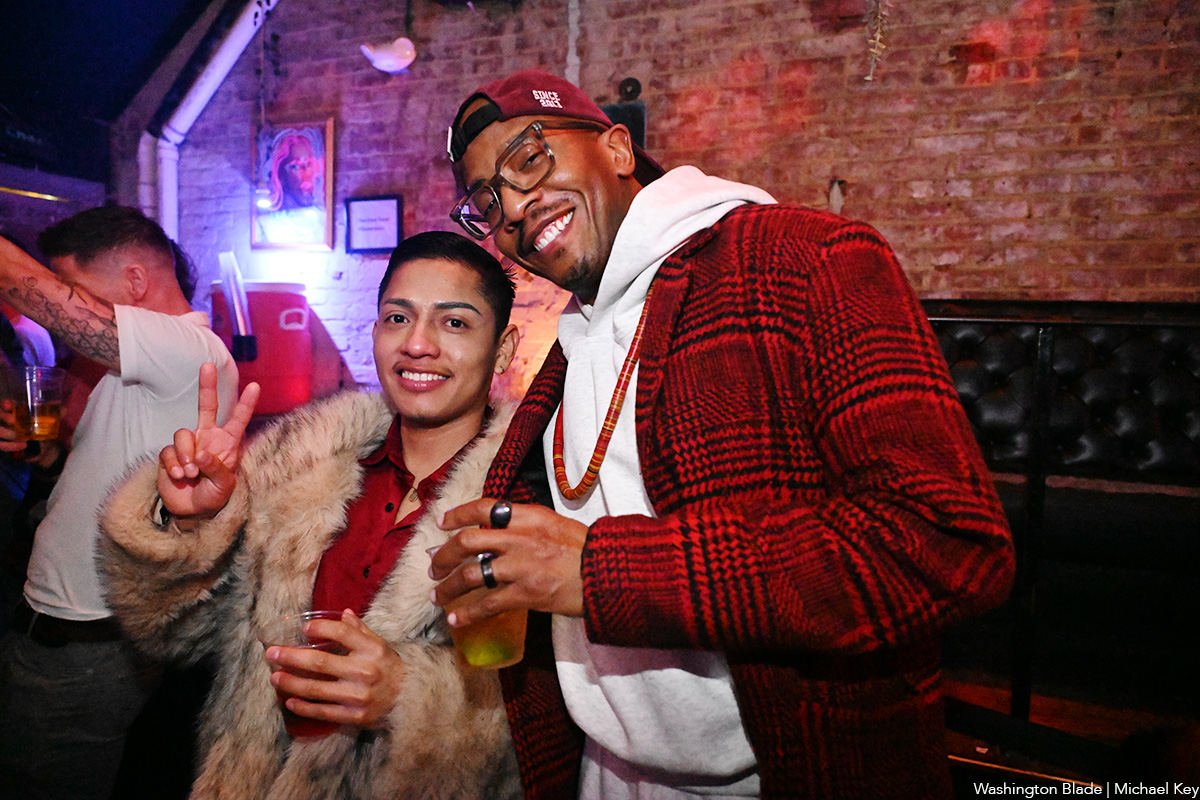
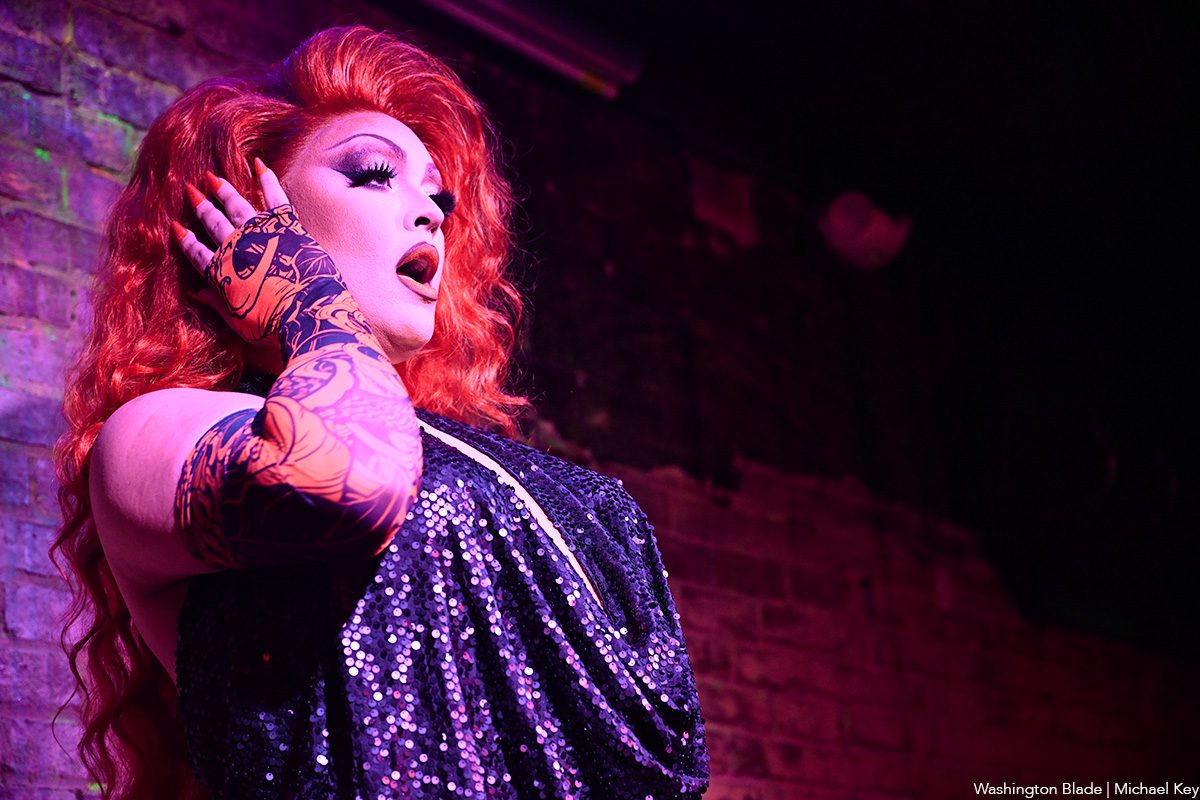
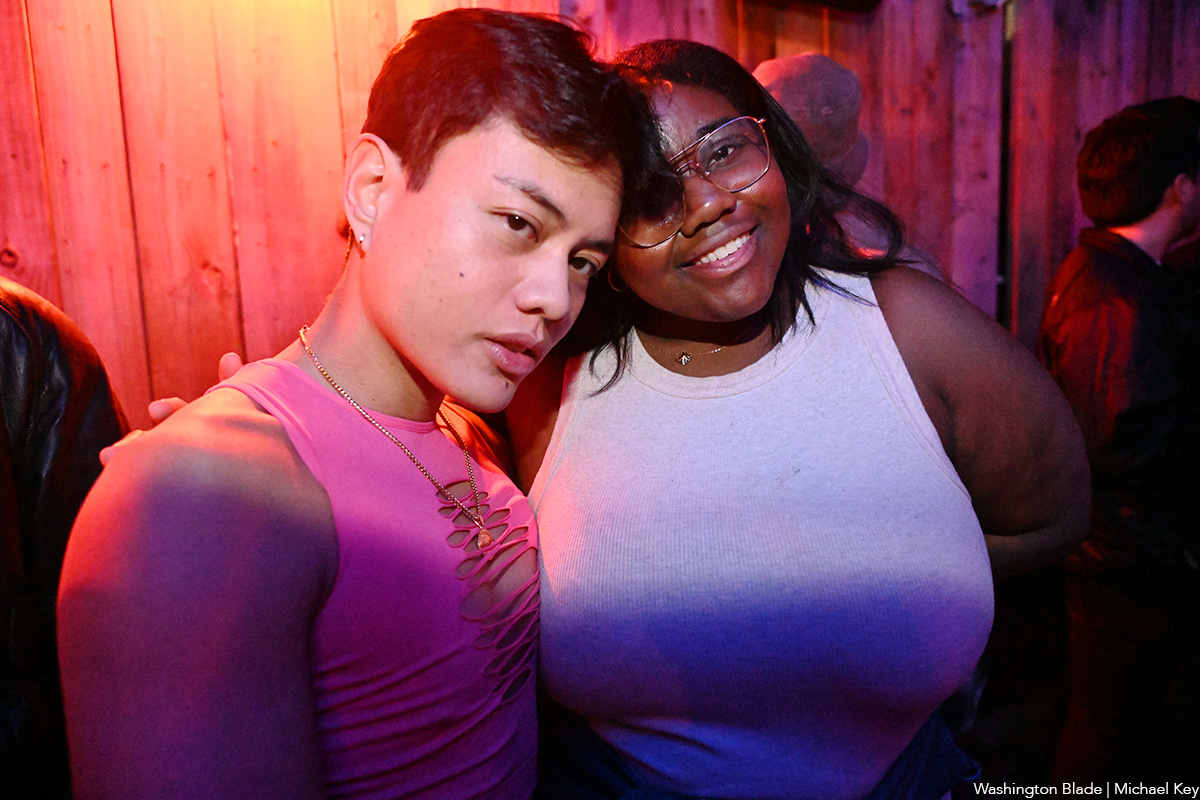
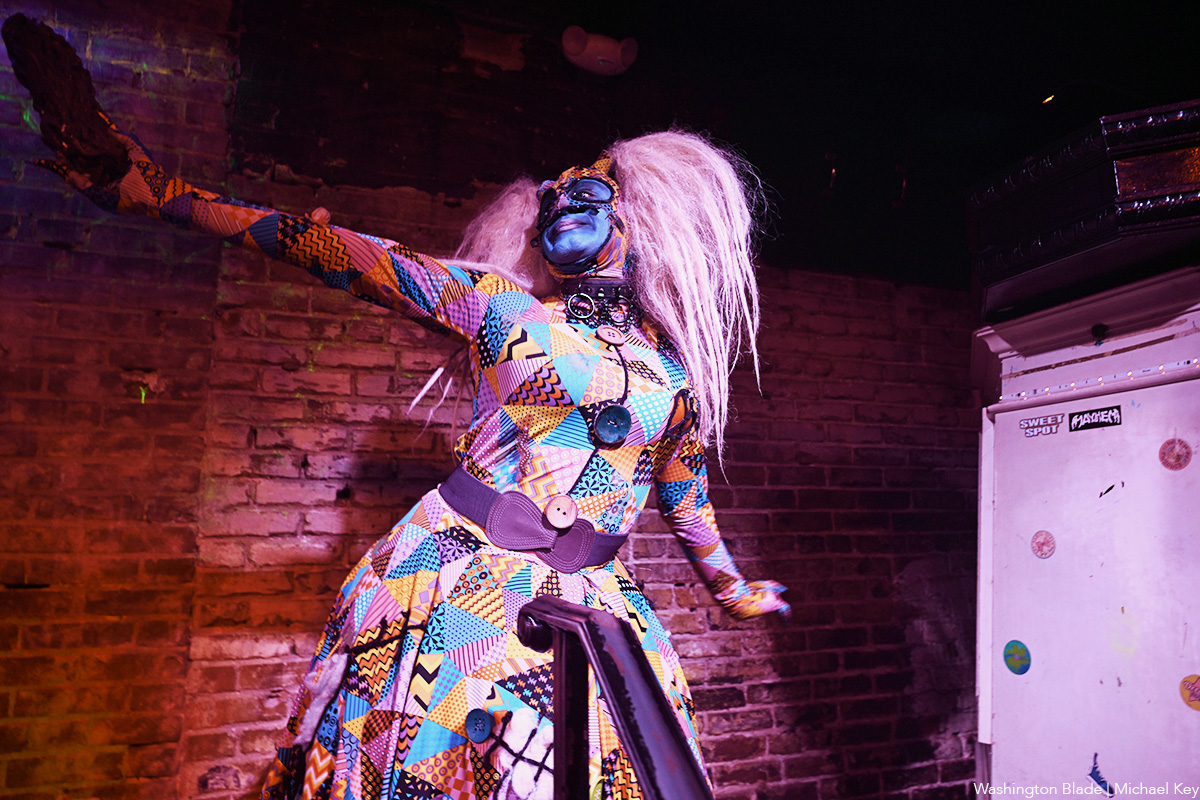
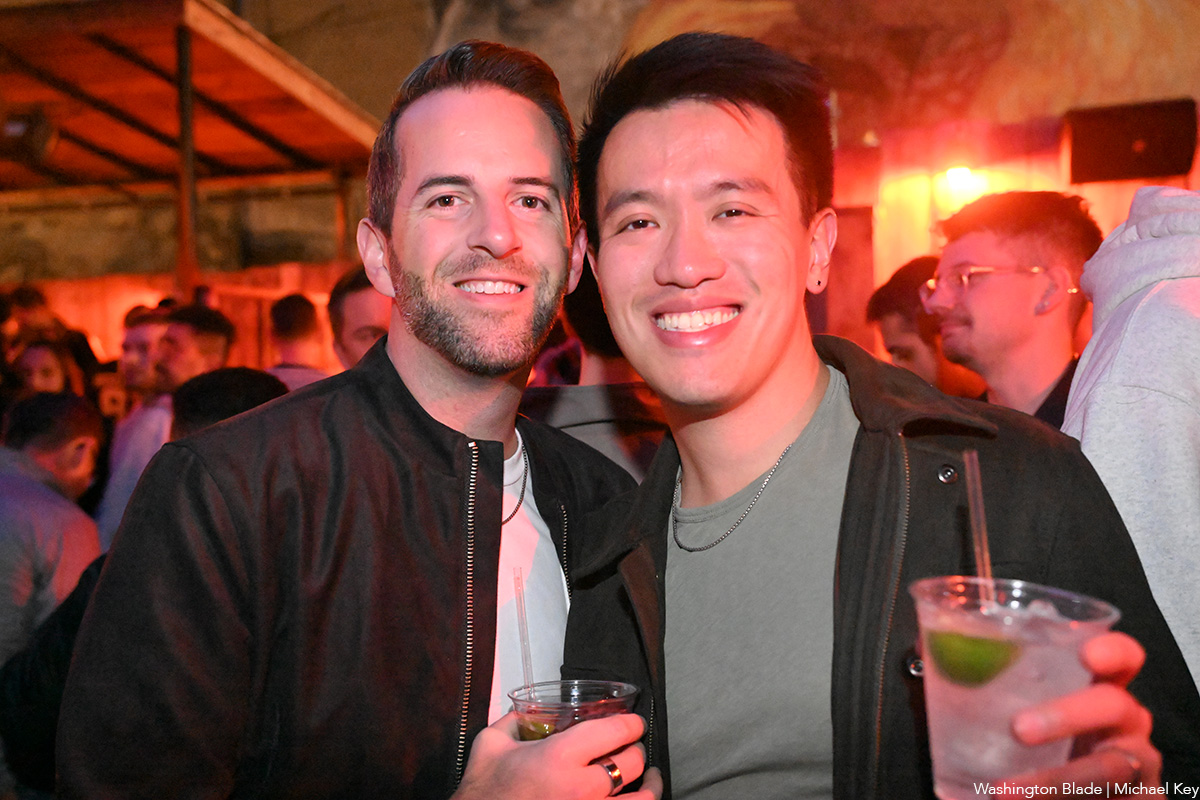
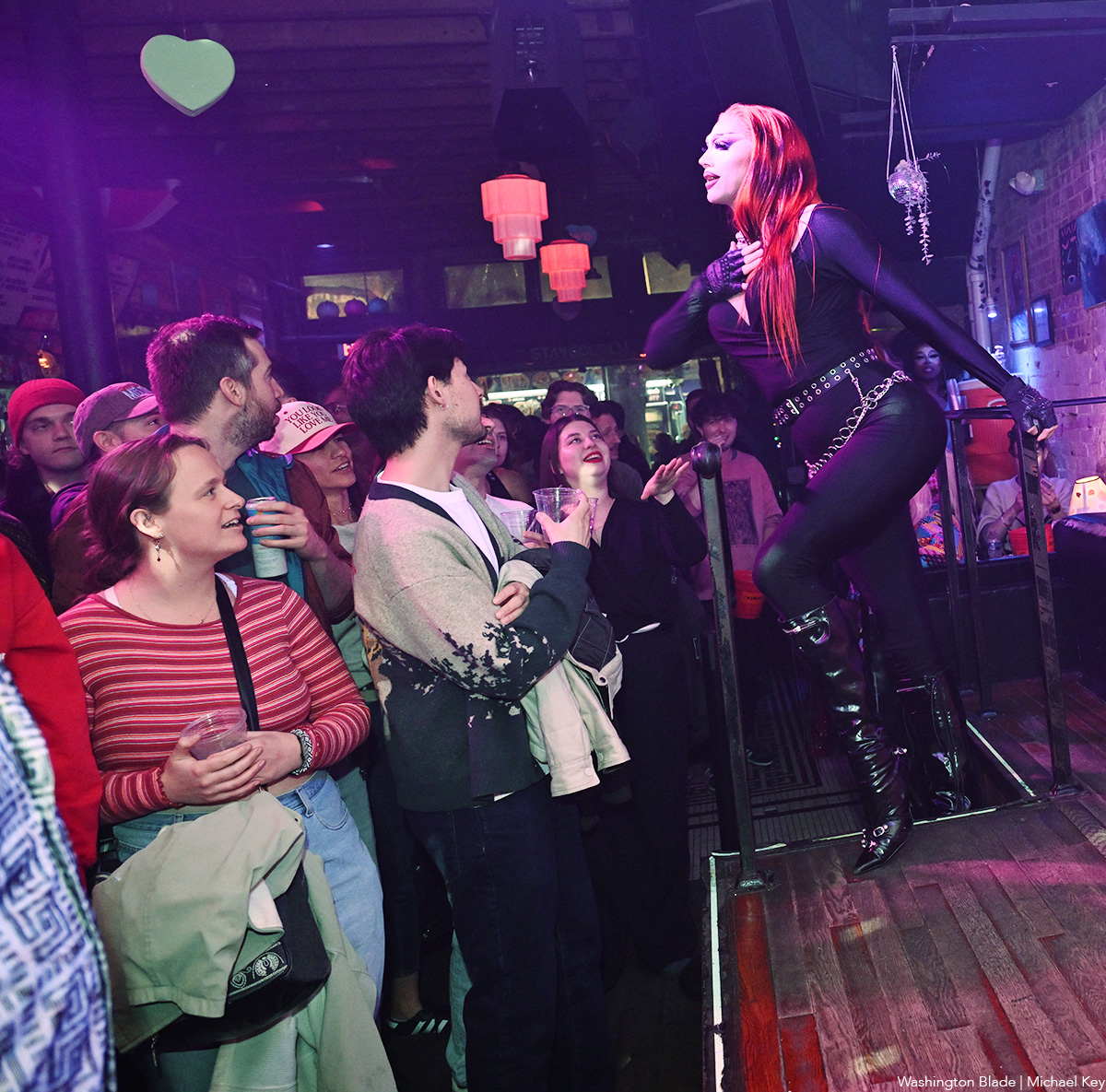
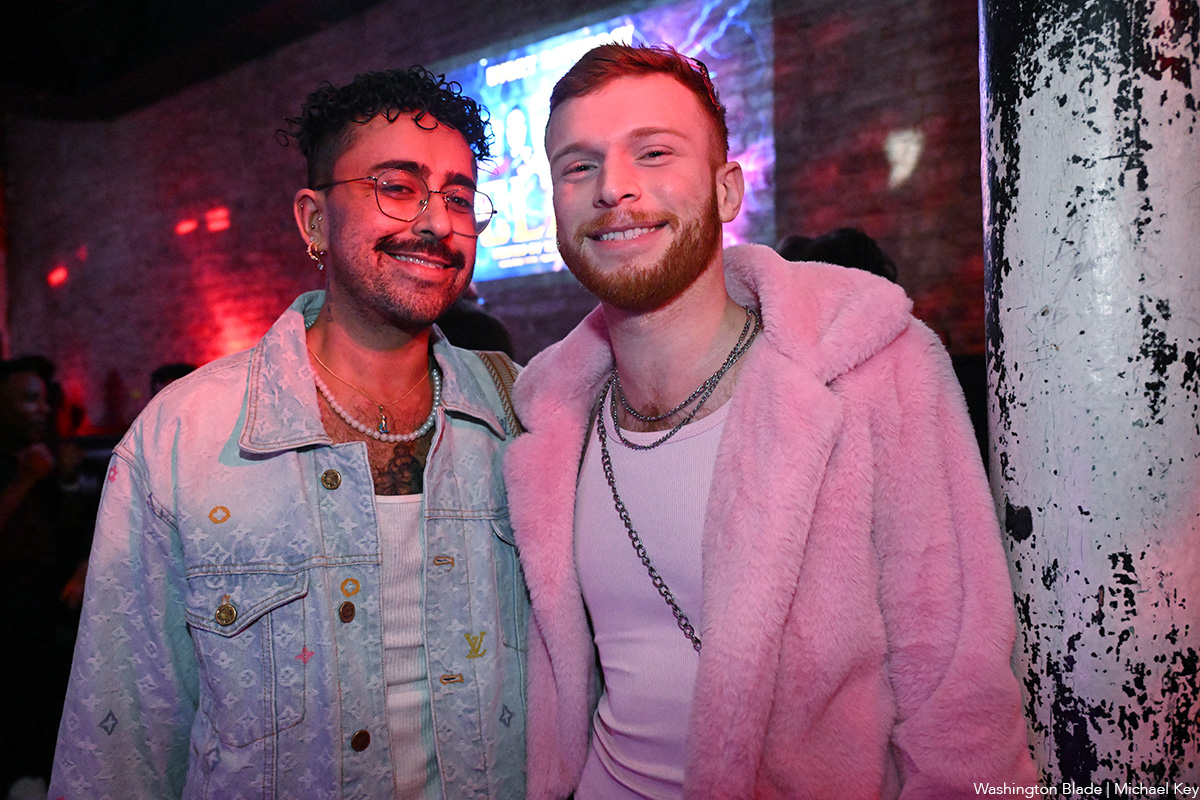
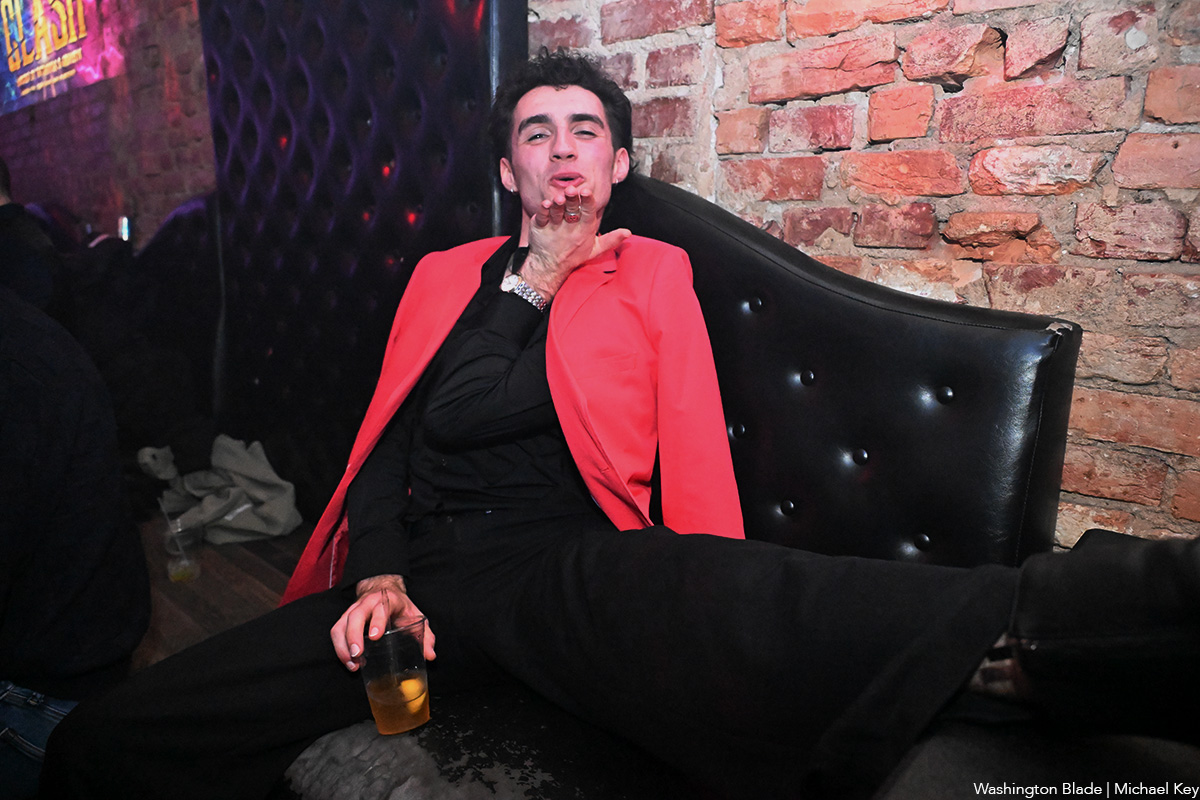
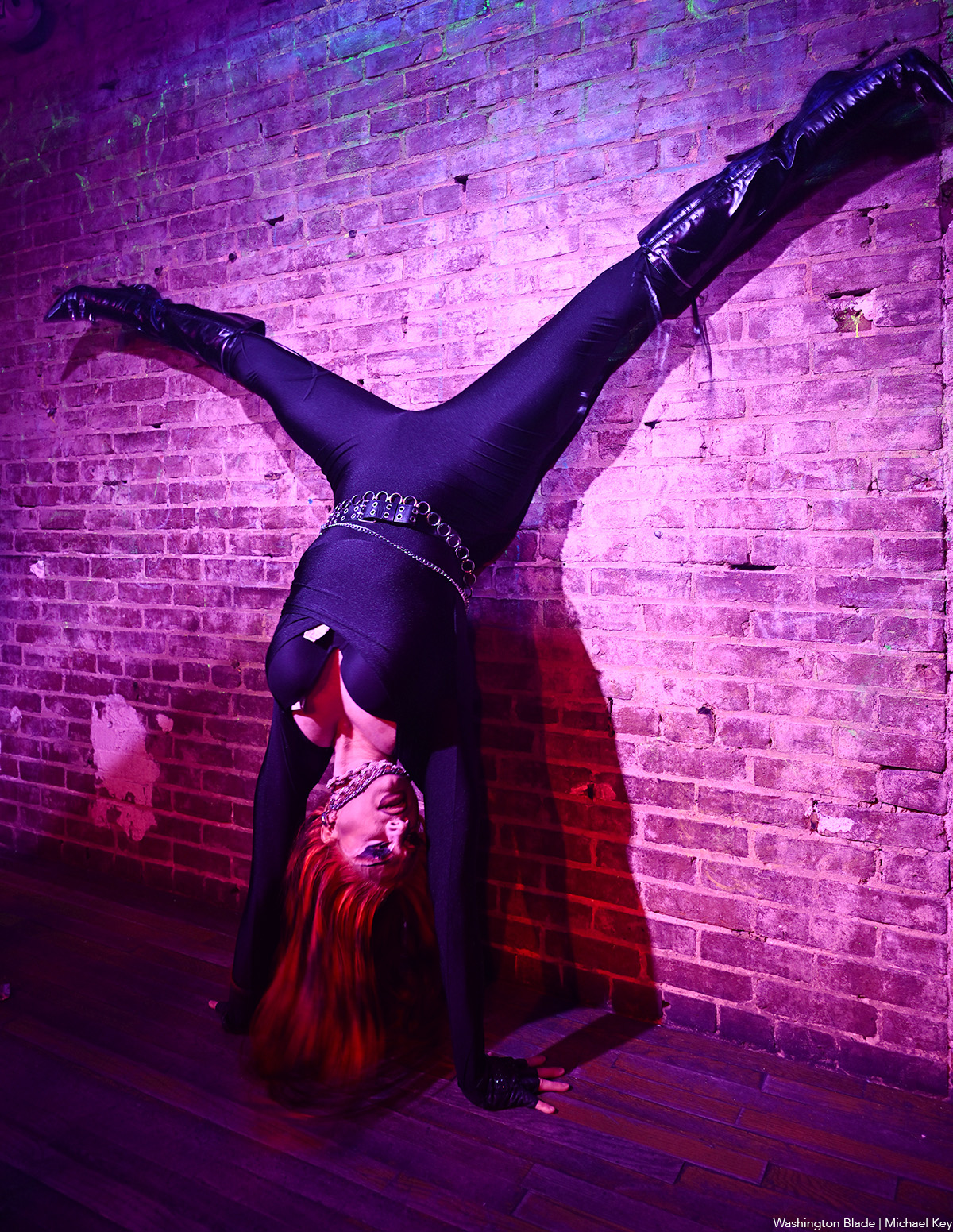
Theater
Magic is happening for Round House’s out stage manager
Carrie Edick talks long hours, intricacies of ‘Nothing Up My Sleeve’

‘Nothing Up My Sleeve’
Through March 15
Round House Theatre
4545 East-West Highway
Bethesda, Md. 20814
Tickets start at $50
Roundhousetheatre.org
Magic is happening for out stage manager Carrie Edick.
Working on Round House Theatre’s production of “Nothing Up My Sleeve,” Edick quickly learned the ways of magicians, their tricks, and all about the code of honor among those who are privy to their secrets.
The trick-filled, one-man show starring master illusionist Dendy and staged by celebrated director Aaron Posner, is part exciting magic act and part deeply personal journey. The new work promises “captivating storytelling, audience interaction, jaw-dropping tricks, and mind-bending surprises.”
Early in rehearsals, there was talk of signing a non-disclosure agreement (NDA) for production assistants. It didn’t happen, and it wasn’t necessary, explains Edick, 26. “By not having an NDA, Dendy shows a lot of trust in us, and that makes me want to keep the secrets even more.
“Magic is Dendy’s livelihood. He’s sharing a lot and trusting a lot; in return we do the best we can to support him and a large part of that includes keeping his secrets.”
As a production assistant (think assistant stage manager), Edick strives to make things move as smoothly as possible. While she acknowledges perfection is impossible and theater is about storytelling, her pursuit of exactness involves countless checklists and triple checks, again and again. Six day weeks and long hours are common. Stage managers are the first to arrive and last to leave.
This season has been a lot about learning, adds Edick. With “The Inheritance” at Round House (a 22-week long contract), she learned how to do a show in rep which meant changing from Part One to Part Two very quickly; “In Clay” at Signature Theatre introduced her to pottery; and now with “Nothing Up My Sleeve,” she’s undergoing a crash course in magic.
She compares her career to a never-ending education: “Stage managers possess a broad skillset and that makes us that much more malleable and ready to attack the next project. With some productions it hurts my heart a little bit to let it go, but usually I’m ready for something new.”
For Edick, theater is community. (Growing up in Maryland, she was a shy kid whose parents signed her up for theater classes.) Now that community is the DMV theater scene and she considers Round House her artistic home. It’s where she works in different capacities, and it’s the venue in which she and actor/playwright Olivia Luzquinos chose to be married in 2024.
Edick came out in middle school around the time of her bat mitzvah. It’s also around the same time she began stage managing. Throughout high school she was the resident stage manager for student productions, and also successfully participated in county and statewide stage management competitions which led to a scholarship at the University of Maryland, Baltimore County (UMBC) where she focused on technical theater studies.
Edick has always been clear about what she wants. At an early age she mapped out a theater trajectory. Her first professional gig was “Tuesdays with Morrie” at Theatre J in 2021. She’s worked consistently ever since.
Stage managing pays the bills but her resume also includes directing and intimacy choreography (a creative and technical process for creating physical and emotional intimacy on stage). She names Pulitzer Prize winning lesbian playwright Paula Vogel among her favorite artists, and places intimacy choreographing Vogel’s “How I learned to Drive” high on the artistic bucket list.
“To me that play is heightened art that has to do with a lot of triggering content that can be made very beautiful while being built to make you feel uncomfortable; it’s what I love about theater.”
For now, “Nothing Up My Sleeve” keeps Edick more than busy: “For one magic trick, we have to set up 100 needles.”
Ultimately, she says “For stage managers, the show should stay the same each night. What changes are audiences and the energy they bring.”

Friday, February 13
Center Aging Monthly Luncheon With Yoga will be at noon at the DC Center for the LGBT Community. Email Mac at [email protected] if you require ASL interpreter assistance, have any dietary restrictions, or questions about this event.
Go Gay DC will host “LGBTQ+ Community Happy Hour Meetup” at 7 p.m. at Freddie’s Beach Bar and Restaurant. This is a chance to relax, make new friends, and enjoy happy hour specials at this classic retro venue. Attendance is free and more details are available on Eventbrite.
Women in their Twenties and Thirties will be at 7 p.m. on Zoom. This is a social discussion group for queer women in the D.C. area. For more details, visit the group on Facebook.
Saturday, February 14
Go Gay DC will host “LGBTQ+ Community Brunch” at 11 a.m. at Freddie’s Beach Bar & Restaurant. This fun weekly event brings the DMV area LGBTQ community, including allies, together for delicious food and conversation. Attendance is free and more details are available on Eventbrite.
The DC Center for the LGBT Community will host a screening of “Love and Pride” at 1:30 p.m. This event is a joy-filled global streaming celebration honoring queer courage, Pride, and the power of love. It’s a bold celebration of courage and community — a fearless reminder of what we’ve overcome, how love is what makes us unstoppable, and how we have always turned fear into fierce. For more details, visit the Center’s website.
Sunday, February 15
LGBTQ+ Community Coffee and Conversation will be at 12 p.m. at As You Are. This event is for people looking to make more friends and meaningful connections in the LGBTQ community. Attendance is free and more details are available on Eventbrite.
Monday, February 16
Queer Book Club will be at 7:00p.m. on Zoom. This month’s read is “Faebound” by Saara El-Arifi. For more details, visit the DC Center’s website.
“Center Aging: Monday Coffee Klatch” will be at 10 a.m. on Zoom. This is a social hour for older LGBTQ+ adults. Guests are encouraged to bring a beverage of choice. For more information, contact Adam ([email protected]).
Tuesday, February 17
Center Bi+ Roundtable will be at 7 p.m. on Zoom. This is an opportunity for people to gather in order to discuss issues related to bisexuality or as Bi individuals in a private setting.Visit Facebook or Meetup for more information.
Wednesday, February 18
Job Club will be at 6 p.m. on Zoom upon request. This is a weekly job support program to help job entrants and seekers, including the long-term unemployed, improve self-confidence, motivation, resilience and productivity for effective job searches and networking — allowing participants to move away from being merely “applicants” toward being “candidates.” For more information, email [email protected] or visit thedccenter.org/careers.
Thursday, February 19
The DC Center’s Fresh Produce Program will be held all day at the DC Center for the LGBT Community. To be fair with who is receiving boxes, the program is moving to a lottery system. People will be informed on Wednesday at 5 p.m. if they are picked to receive a produce box. No proof of residency or income is required. For more information, email [email protected] or call 202-682-2245.
Virtual Yoga Class will be at 7 p.m. on Zoom. This free weekly class is a combination of yoga, breath work and meditation that allows LGBTQ+ community members to continue their healing journey with somatic and mindfulness practices. For more details, visit the DC Center’s website.




















